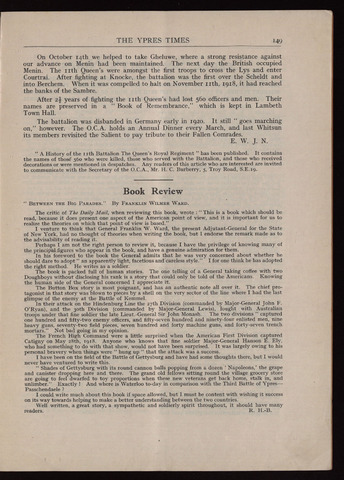Book Review
THE YPRES TIMES
14.9
On October 14th we helped to take Gheluwe, where a strong resistance against
our advance on Menin had been maintained. The next day the British occupied
Menin. The nth Queen's were amongst the first troops to cross the Lys and enter
Courtrai. After fighting at Knocke, the battalion was the first over the Scheldt and
into Berchem. When it was compelled to halt on November nth, 1918, it had reached
the banks of the Sambre.
After 2 J years of fighting the nth Queen's had lost 560 officers and men. Their
names are preserved in a Book of Remembrance," which is kept in Lambeth
Town Hall.
The battalion was disbanded in Germany early in 1920. It still goes marching
on," however. The O.C.A. holds an Annual Dinner every March, and last Whitsun
its members revisited the Salient to pay tribute to their Fallen Comrades.
E. W. J. N.
A History of the 1 ith Battalion The Queen's Royal Regiment has been published. It contains
the names of those 560 who were killed, those who served with the Battalion, and those who received
decorations or were mentioned in despatches. Any readers of this article who are interested are invited
to communicate with the Secretary of the O.C.A.Mr. H. C. Burberry, 5, Troy Road, S.E.19.
Between the Big Parades." By Franklin Wilmer Ward.
The critic of The Daily Mail, when reviewing this book, wrote "This is a book which should be
read, because it does present one aspect of the American point of view, and it is important for us to
realize the theories on which that point of view is based."
I venture to think that General Franklin W. Ward, the present Adjutant-General for the State
of New York, had no thought of theories when writing the book, but I endorse the remark made as to
the advisability of reading it.
Perhaps I am not the right person to review it, because I have the privilege of knowing many of
the principal figures who appear in the book, and have a genuine admiration for them.
In his foreword to the book the General admits that he was very concerned about whether he
should dare to adopt an apparently light, facetious and careless style." I for one think he has adopted
the right method. He writes as a soldier.
The book is packed full of human stories. The one telling of a General taking coffee with two
Doughboys without disclosing his rank is a story that could only be told of the Americans. Knowing
the human side of the General concerned I appreciate it.
The Button Box story is most poignant, and has an authentic note all over it. The chief pro
tagonist in that story was blown to pieces by a shell on the very sector of the line where I had the last
glimpse of the enemy at the Battle of Kemmel.
In their attack on the Hindenburg Line the 27th Division (commanded by Major-General John F.
O'Ryan), and the 30th Division (commanded by Major-General Lewis), fought with Australian
troops under that fine soldier the late Lieut.-General Sir John Monash. The two divisions captured
one hundred and fifty-two enemy officers, and fifty-seven hundred and ninety-four enlisted men, nine
heavy guns, seventy-two field pieces, seven hundred and forty machine guns, and forty-seven trench
mortars." Not bad going in my opinion.
The French High Command were a little surprised when the American First Division captured
Catigny on May 28th, 1918. Anyone who knows that fine soldier Major-General Hanson E. Ely,
who had something to do with that show, would not have been surprised. It was largely owing to his
personal bravery when things were hung up that the attack was a success.
I have been on the field of the Battle of Gettysburg and have had some thoughts there, but I would
never have ventured to write this.
Shades of Gettysburg with its round cannon balls popping from a dozen Napoleons,' the grape
and canister dropping here and there. The grand old fellows sitting round the village grocery store
are going to feel dwarfed to toy proportions when these new veterans get back home, stalk in, and
unlimber." Exactly And where is Waterloo to-day in comparison with the Third Battle of Ypres
Passchendaele
I could write much about this book if space allowed, but I must be content with wishing it success
on its way towards helping to make a better understanding between the two countries.
Well written, a great story, a sympathetic and soldierly spirit throughout, it should have many
readers. R. H.-B.

